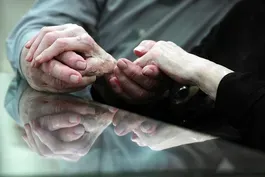
Do soda taxes improve health? What some cities have found
Clip: 5/24/2025 | 9m 41sVideo has Closed Captions
Does taxing sugary drinks result in better health outcomes? What some cities have found
Experts say drinking a lot of sweetened beverages can lead to obesity, diabetes and heart disease. This week, the federal government reversed decades of policy and allowed states to ban the use of food stamps to buy soda and other sweetened drinks. In addition, a handful of cities have put taxes on them over strong objections from the beverage industry. John Yang reports.
Problems with Closed Captions? Closed Captioning Feedback
Problems with Closed Captions? Closed Captioning Feedback
Major corporate funding for the PBS News Hour is provided by BDO, BNSF, Consumer Cellular, American Cruise Lines, and Raymond James. Funding for the PBS NewsHour Weekend is provided by...

Do soda taxes improve health? What some cities have found
Clip: 5/24/2025 | 9m 41sVideo has Closed Captions
Experts say drinking a lot of sweetened beverages can lead to obesity, diabetes and heart disease. This week, the federal government reversed decades of policy and allowed states to ban the use of food stamps to buy soda and other sweetened drinks. In addition, a handful of cities have put taxes on them over strong objections from the beverage industry. John Yang reports.
Problems with Closed Captions? Closed Captioning Feedback
How to Watch PBS News Hour
PBS News Hour is available to stream on pbs.org and the free PBS App, available on iPhone, Apple TV, Android TV, Android smartphones, Amazon Fire TV, Amazon Fire Tablet, Roku, Samsung Smart TV, and Vizio.
Providing Support for PBS.org
Learn Moreabout PBS online sponsorshipJOHN YANG: Experts say drinking a lot of sweetened beverages can lead to obesity, diabetes and heart disease.
This week, the federal government reversed decades of policy and allowed states to ban the use of food stamps to buy soda and other sweetened drinks.
In addition, a handful of cities have put taxes on them over the strong objections of the beverage industry.
To find out more, went to opposite coasts.
JOHN YANG (voice-over): At a corner shop in Philadelphia, steps from the Liberty Bell, a 20 ounce bottle of Coca Cola cost $3.09.
But just a few miles south beyond the city limits, a PBS News producer found a price of $2.79, 30 cents cheaper.
Why the difference?
Since 2017, Philadelphia has taxed sugar sweetened drinks at a rate of 1 1/2 cents an ounce.
The city council imposed the levy as a public health measure.
CHRISTINA ROBERTO, University of Pennsylvania: I did not think a sweetened beverage tax was going to actually impact health.
JOHN YANG: Why not?
CHRISTINA ROBERTO: Well, it's just very difficult to influence weight.
Our bodies are biologically designed to actually help us keep weight once we gain it.
JOHN YANG (voice-over): Christina Roberto and researchers at the University of Pennsylvania track the effects of the tax.
Some of what they found surprised them.
CHRISTINA ROBERTO: The overall effect of the tax in Philly was a 35 percent reduction in sales of these tax drinks.
Now, I've been working in this area for about 20 years.
And I have never seen a behavioral effect that large.
Right.
Like eating behavior is so hard to change, let alone change it over the long term.
And so to me, I just felt like, oh my gosh, this is an incredible intervention to actually get people to, you know, stop or consume fewer of these drinks that we know are making us sick.
JOHN YANG: So people buying less, drinking less, you wanted to find out what that translated into.
CHRISTINA ROBERTO: The rate at which they were gaining weight in Philadelphia was a bit slower than in these places nearby that weren't subject to the tax.
You're seeing a health effect on an outcome that is incredibly difficult to move.
JOHN YANG: Philadelphia is the biggest U.S. City with a sugar sweetened beverage tax on the books.
Here, 3,000 miles away, the beach town of Santa Cruz, California has become the latest city to approve one.
MARTINE WATKINS, Former Mayor, Santa Cruz, California: It's a great place to be.
Yeah, I really enjoyed it.
JOHN YANG (voice-over): Martine Watkins, former mayor of this city of about 60,000 people, began pushing the tax in 2016 when she first ran for city council.
The idea came from her brother, who works in health policy.
He also urged her to think about health in all policy decisions.
MARTINE WATKINS: He was like teens.
That's what he calls me.
You got to do this.
Learning about that framework really resonated with me.
And that health is more than hospitals, health is more than healthcare.
Health is the environment in which we're able to thrive in.
And how I, at the local level, could influence that.
JOHN YANG (voice-over): Beginning in 2014, when Berkeley voters passed the nation's first modern soda tax, similar levies were approved in other California cities.
In the face of this building momentum at the ballot box, the beverage industry turned to state lawmakers.
In Sacramento, a lobbying effort won passage of a law banning local soda taxes until 2031.
Despite that, last year, led by current Santa Cruz mayor Fred Keeley and Vice Mayor Shebreh Kalantari-Johnson, the city council put a 2 cent an ounce tax on sugar sweetened soft drinks on the ballot.
JOHN YANG: Were you looking to challenge the state law?
SHEBREH KALANTARI-JOHNSON, Vice Mayor, Santa Cruz: We were looking to do what is within our rights as a charter city to raise revenue for our community and invest it back in health.
That's what were looking to do.
JOHN YANG: And Mr. Mayor, what were your thoughts about this?
I mean, I would imagine a more cautious mayor might have said, I don't want to get into this fight.
I see court challenges ahead.
I see rough waters ahead.
MAYOR FRED KEELEY, Santa Cruz: The thought that the city has is that, to put it bluntly, this is the right thing to do and not to be scared off by an industry with a very large war chest and a very determined approach to smothering these in the cradle every time they get a chance to do so.
JOHN YANG (voice-over): The opposition in Santa Cruz was a replay of what the beverage industry did in Philadelphia in 2016.
Back then, it organized a broad coalition that included the Teamsters Union and characterized the soda tax as a regressive tax on groceries.
Even in much smaller Santa Cruz, the industry went all out.
JOHN YANG: Talk a bit about what the beverage industry did with all that money.
How did they deliver their message?
FRED KEELEY: Well, I would think a shorter answer is what didn't they do?
I think the only thing they didn't do was skywriting.
Other than that, they did everything.
And I think that's part of why they lost, Frankly.
They spent $2.8 million to get 7, 8, 9,000 votes.
They could have walked around handing out hundred dollar bills to people.
That may have been a better outcome for them.
WOMAN: So don't swallow the spin.
Vote no on Measure Z. JOHN YANG (voice-over): The campaign against the tax, which was on the ballot as Measure Z, drew on the high cost of living in Santa Cruz.
FAITH, Santa Cruz Educator: Santa Cruz just hiked the sales tax on groceries.
Now they want to hit us again.
JOHN YANG (voice-over): The coalition the beverage industry organized was called the Campaign for an Affordable Santa Cruz.
MARTINE WATKINS: If you're looking on YouTube, on the TV or on just the local news station, there's just advertisements, mailers.
I have some here if you want to see.
JOHN YANG: Please show it to us.
MARTINE WATKINS: Yeah, I mean, every day, nearly you would get a mailer coming in to your home and talking about why you should vote no on Measure Z. JOHN YANG: And how did they characterize it?
What was their argument?
MARTINE WATKINS: You know, their argument was, I think they had sort of two.
Well, it looks like they had more or less three, failed, regressive and illegal.
LOLIS RAMIRES, California: We would show up and everyone would get a clipboard with a hefty packet of information.
JOHN YANG (voice-over): The yes side relied on a small group of canvassers led by Lolis Ramirez, a veteran of California grassroots campaigns, and Blythe Young of the American Heart Association.
BLYTHE YOUNG, American Heart Association: We found that giving people their neighborhoods to go talk to their neighbors about this tax and explain why it was important to them, what brought them to this issue was really compelling.
LOLIS RAMIRES: My father has type 2 diabetes.
My grandmother has type 2 diabetes.
You know, I am a Latina.
I'm likely to have it in my life if I don't make good choices for myself.
JOHN YANG (voice-over): Organizers behind the tax said it was crucial to have some small business owners on their side.
Damani Thomas, head chef and owner of Oswald, a downtown restaurant, said he'd seen and experienced the effects of sugary drinks firsthand.
DAMANI THOMAS, Owner, Oswald: Being a black person, I know a lot of people are pre-diabetic.
A lot of the youngsters are pre diabetic.
When I was a young person, me and My friends, we would get this thing that was called the Thirsty 2 Ouncer.
It's a 32 ounce soda, and we would get every flavor and we call it a suicide.
And you know, at the end of the day, you know, if you keep going with that, it is suicide.
JOHN YANG: And since sugary drinks are a major contributor tooth decay, the most common childhood disease, dentists were natural allies.
WOMAN: Yes.
Thank you.
LAURA MARCUS, CEO, Dientis: Speaking to as many people as possible is the way that these grassroots movements actually work.
JOHN YANG: Laura Marcus is the CEO of Dientis, a Santa Cruz nonprofit providing affordable dental care for low income residents.
LAURA MARCUS: We saw what happened when the tobacco tax was passed in our state and the profound impact it had on smoking rates.
It was incredible.
People stopped smoking.
A small 2 cent tax is something that won't have a profound impact on the individual, but yet could in the end have a large impact on the community.
JOHN YANG (voice-over): In fact, the Penn study of the Philadelphia tax found a large impact on the very type of patient that Dientis serves.
CHRISTINA ROBERTO: When we broke our sample down by people who were on Medicaid or not, that group had a 20 percent reduction in dental caries.
And we saw the same thing in adults as in kids.
JOHN YANG (voice-over): In the end, the no side spent $2.8 million.
The yes side less than $100,000.
JOHN YANG: Going into the election day.
Were you confident?
Were you worried?
MARTINE WATKINS: I'm always worried.
JOHN YANG: What was the margin?
MARTINE WARKINS: Slim.
You were about 52.
About 52 percent.
JOHN YANG (voice-over): On May 1, Santa Cruz began collecting the tax in defiance of the statewide ban.
City officials are braced for a court fight with the beverage industry.
In a statement to PBS News, the American Beverage Association said, we are assessing our next steps to as Santa Cruz implements its illegal tax.
Despite the prospect of rough legal seas ahead, Santa Cruz officials hope their new tax will encourage actions by other states and cities.
JOHN YANG: Now on the NewsHour Instagram account, Kermit the Frog gives this year's University of Maryland graduates and advice on staying together and following their dreams.
All that and more is on the Instagram account.
And that is PBS News Weekend for this Saturday.
Tomorrow, an endurance swimmers plan to circle Martha's Vineyard to change perceptions about sharks 50 years after the premiere of the movie Jaws.
I'm John Yang.
For all of my colleagues, thanks for joining us.
See you tomorrow.
How proposed Medicaid cuts could affect family caregivers
Video has Closed Captions
Clip: 5/24/2025 | 4m 59s | How the GOP’s proposed Medicaid cuts could affect millions of family caregivers (4m 59s)
Link found between pre-teen social media use and depression
Video has Closed Captions
Clip: 5/24/2025 | 5m 5s | New study finds link between pre-teen use of social media and depression (5m 5s)
News Wrap: Ukraine and Russia exchange hundreds of POWs
Video has Closed Captions
Clip: 5/24/2025 | 3m 9s | News Wrap: Ukraine and Russia exchange hundreds of POWs (3m 9s)
Providing Support for PBS.org
Learn Moreabout PBS online sponsorshipSupport for PBS provided by:
Major corporate funding for the PBS News Hour is provided by BDO, BNSF, Consumer Cellular, American Cruise Lines, and Raymond James. Funding for the PBS NewsHour Weekend is provided by...














